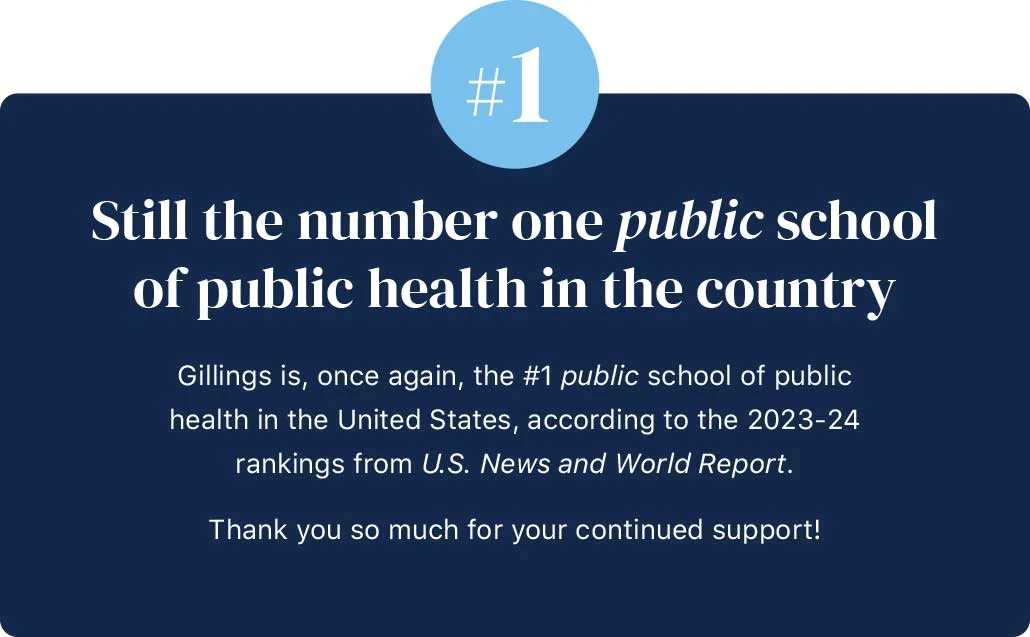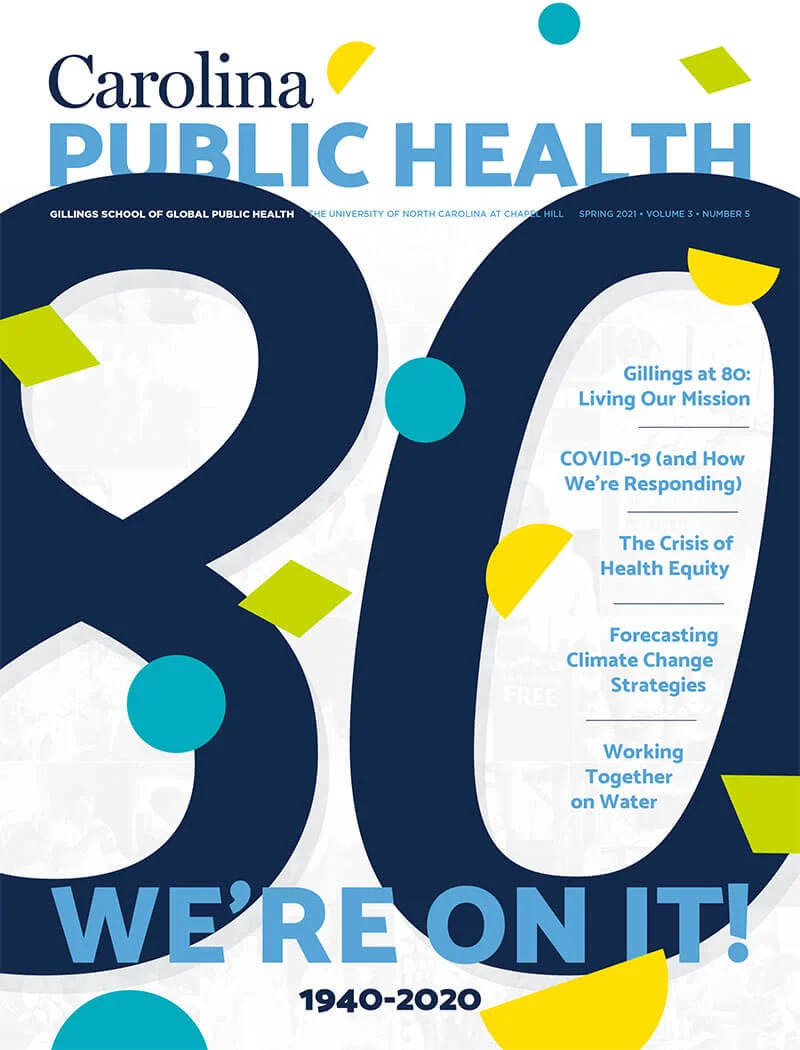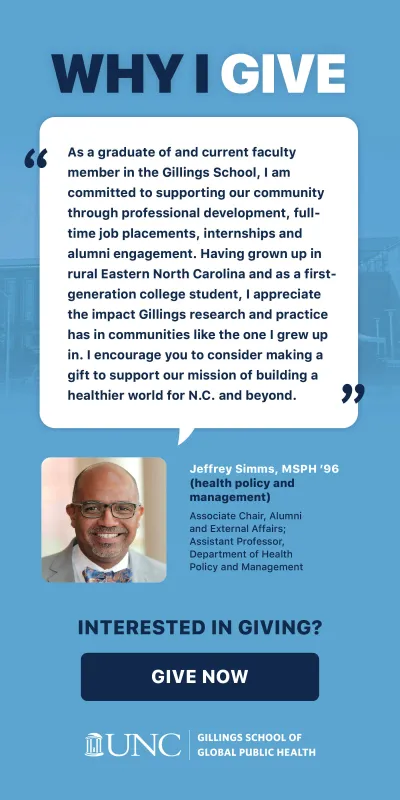Gillings alumni, students and faculty respond to COVID
Decades of research groundwork fuels COVID treatments
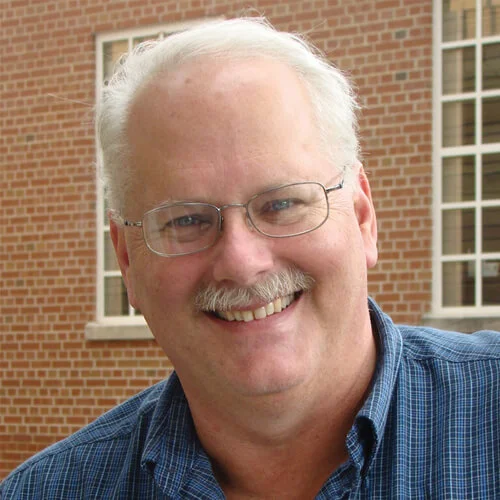
Ralph Baric, PhD, was one of the 30,000 participants in last year’s Phase III clinical trials for Moderna’s coronavirus vaccine. Besides being one of the studied, he’s a world-leading expert on coronaviruses.
For the past 35 years, Baric, the William R. Kenan Jr. Distinguished Professor of epidemiology, has been developing and using unique methods to study coronavirus genetics, to investigate how they replicate and spread, and to test drugs that could help fight multiple coronavirus strains in the event of a future outbreak.
Baric and his team first conducted experiments in the mid-1990s suggesting that animal coronaviruses could jump to other animals fairly quickly. They later found that the viruses also had the potential to easily enter human cells. “We proposed that this family of emerging viruses are on the move and that we needed to be alert to their potential to cause human disease outbreaks,” he says. After the 2003 SARS-CoV outbreak in Southeast Asia, his group identified a number of zoonotic SARS-like coronaviruses that were poised for cross-species transmission, alerting the world of potential future outbreaks of this highly pathogenic respiratory virus.
Decades of fundamental groundwork meant that when the COVID-19 pandemic hit, Baric’s lab – one of the first places in the country to receive a sample of the virus to study – already had two potential treatments ready for clinical trials.
Remdesivir, the first experimental treatment shown in clinical trials to speed recovery time for COVID-19 patients, was developed in Baric’s lab as part of a years-long collaboration with Gilead Sciences and is being used in hospitals around the world. The lab has played a key role in the development and testing of Molnupiravir (EIDD-0128), which can be administered orally, and participated in the development of several human monoclonal antibody therapies.
Baric and his team – which includes expert virologists and assistant epidemiology professors Lisa Gralinski, PhD, and Timothy Sheahan, PhD, along with nearly 40 other faculty, postdocs, staff and students – have done pivotal research on antibody treatments, the Moderna and Johnson & Johnson vaccines, and other potential therapies. They developed and tested a new design approach for a universal vaccine that works against many different “high risk” SARS-related coronavirus strains and already have a paper under review describing this work.
“I can’t say enough about the extraordinary people in the lab. We were all working 16 to 18 hours a day and on weekends doing research, writing papers and engaging with a dozen federal task forces that were trying to get vaccines and drugs out to people and make policy,” Baric says. “It has been nonstop efforts by a community of dedicated researchers. So far, there are nine products we’ve been associated with that are in Phase II trials or being used in humans to prevent or treat COVID-19 infection, and some other drugs are also moving forward. That feels pretty good.”
Wastewater tests may show COVID hotspots
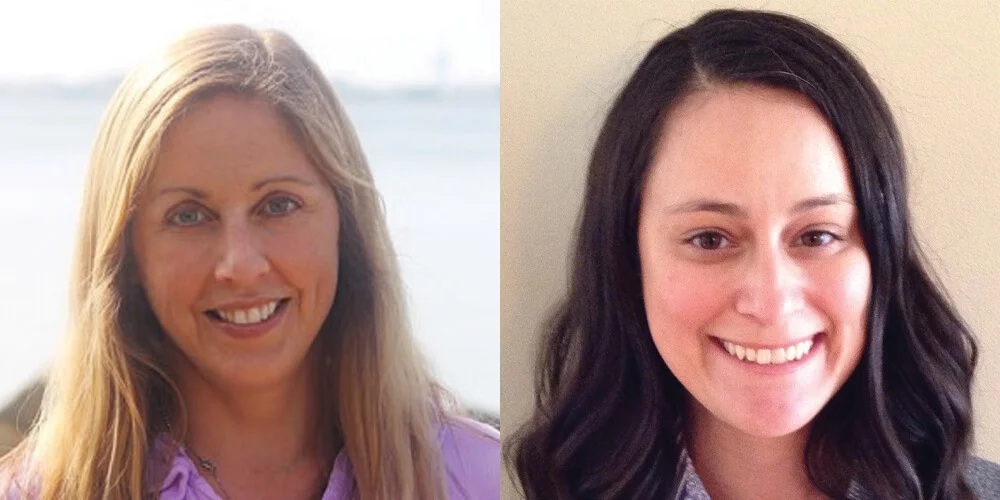
Scientists believe the number of asymptomatic people who are not tested for the coronavirus is significant. To account for asymptomatic carriers and to provide a more complete view of community health, Gillings researchers are quantifying SARS-CoV-2 concentrations in North Carolina wastewater samples.
Leading the study are Rachel Noble, PhD, the Mary and Watts Hill Jr. Distinguished Faculty member at the Institute of Marine Sciences and joint professor of environmental sciences and engineering at Gillings, and Jill Stewart, PhD, the Philip C. Singer Distinguished Professor of environmental sciences and engineering.
Studying concentrations of SARS-CoV-2 in wastewater is a way to better understand the prevalence of COVID-19 infections in a community, because not all who carry the virus have symptoms, and not all people seek clinical testing. Preliminary data showed an increase of SARS-CoV-2 in wastewater five to seven days before spikes in clinical cases, suggesting that viral concentrations in wastewater could be a key indicator for community spread.
“I am excited about the possibilities for wastewater surveillance for COVID-19 and other pathogens,” Stewart says. “Wastewater provides a composite sample for pathogens circulating in a community and includes symptomatic and asymptomatic cases. This type of information is useful for monitoring disease trends at the population level and is more cost effective than traditional epidemiological methods.”
Noble and Stewart collaborate with state agencies and universities across North Carolina to test wastewater systems in about a dozen large cities and smaller municipalities. Originally funded by the NC Policy Collaboratory, the study recently received additional support from the CDC to include more municipalities.
“Our original intent was to build capacity for wastewater surveillance, but we’ve realized that we have fantastic and diverse expertise across the state that can really lead progress in this area,” Noble says. “Not only are we building the pieces of a surveillance system, but we are thinking about the best ways to build surveillance systems for future pandemics. That’s really exciting.”
Vaccination study focuses on college students
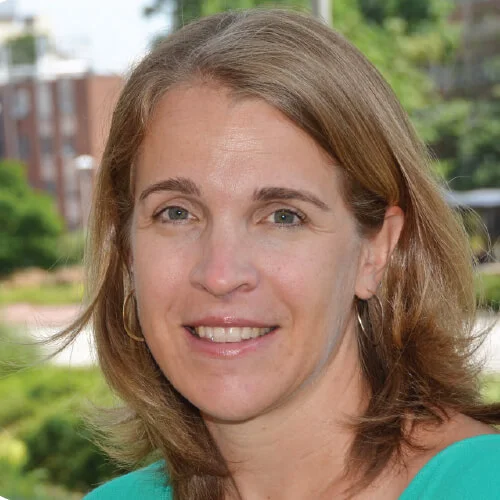
Audrey Pettifor, PhD, professor of epidemiology, is co-leading a nationwide study to test how well COVID-19 vaccines prevent people from spreading the coronavirus to others.
As part of the national Prevent COVID U study conducted by the COVID-19 Prevention Network, UNC is recruiting students who have not yet been vaccinated or had COVID-19 to participate in the four-month trial, where they will be randomized to get the Moderna COVID-19 vaccine immediately or in four months. All participants will be asked to swab their nose daily to test for infection. They also will be asked to enroll their close contacts in the study to examine transmission if the main participant or their contact tests positive.
The study, sponsored by the National Institute of Allergy and Infectious Diseases, includes about 30 universities across the United States. Any university or community college student taking classes is eligible, whether they are studying on campus or online. Results are expected in the fall.
Early in the pandemic, Pettifor, an HIV/AIDS researcher with expertise in risk behaviors among adolescents, began applying her experience in HIV prevention to identify ways to control the spread of the coronavirus.
“There are not a lot of studies looking at the question of transmission – they infer transmission based on infection because if people don’t get the virus, they can’t transmit it,” Pettifor says. “This study is more rigorous and systematic, as the daily nasal swabs will allow us to examine viral dynamics among vaccinated individuals in great detail. Importantly, we will look at how well the vaccine works in the face of new variants that are circulating. We hope the study will answer the question of what you can do when you are vaccinated with a lot more certainty.”
Antibodies paint clearer picture of COVID-19 prevalence

The actual prevalence of COVID-19 is likely higher than estimates suggest due to asymptomatic infection, limited access to testing, and other factors. Ross Boyce, MD, MSc, assistant professor in the School of Medicine, and Allison Aiello, PhD, professor of epidemiology at Gillings, are co-leading antibody research to provide a clearer picture of the virus’s presence.
Aiello and Boyce launched a community-based study of nearly 200 residents in Chatham County, a central N.C. county whose demographics broadly reflect the state’s, to determine more accurate estimates of and risk factors for SARS-CoV-2 infection. Researchers collect nasal swabs every two weeks to test for asymptomatic infection and a blood sample monthly to test for antibodies indicating a prior or recent infection. They collaborate with other universities using similar protocols and surveys, so their data can be aggregated to identify trends in the prevalence of COVID-19 across North Carolina.
Boyce hopes the work in Chatham County will continue even as the pandemic recedes. “A lot of hard work goes into building a population-based cohort. Leveraging that work could advance our understanding of other public health problems,” he says. “If it’s sustained, the Chatham cohort could be a valuable and unique platform for researchers across the UNC community.”
Aiello also co-leads a longitudinal study of front-line health care professionals (HCPs) with Emily Ciccone, MD, MHS, clinical instructor at the UNC School of Medicine, following a group of UNC Health employees to examine risk factors for infection and change in antibody levels over time.
“As we were reviewing the antibody testing results over time for the HCPs and throughout the period when they received their vaccinations, it was evident that those who had prior SARS-CoV-2 infection were experiencing a higher antibody response to the first vaccination,” Aiello says. “When our team analyzed the data, we identified a statistically significant higher antibody response after vaccination among those with prior infection versus those without.”
Their findings offer hope that some who were infected with SARS-CoV-2 might be able to forgo a second vaccination – which could potentially change vaccine distribution strategies – but more research is needed to assess the durability of these responses.
Coordinating an international research response to coronavirus
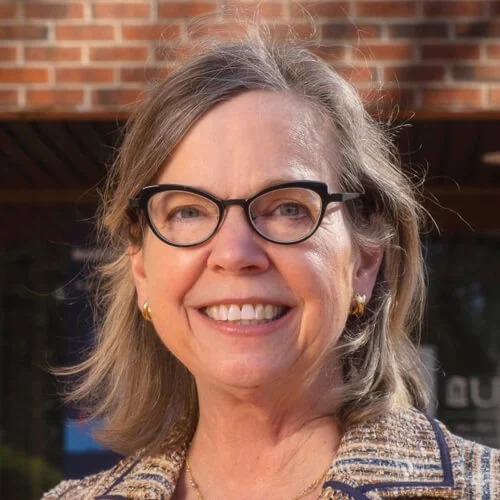
Biostatistics Chair and Professor Lisa LaVange, PhD, is helping lead U.S. efforts to speed development of effective treatments for COVID-19 as part of Accelerating COVID-19 Therapeutic Interventions and Vaccines (ACTIV), a public-private partnership bringing together more than a dozen leading biopharmaceutical companies and government agencies to collaborate internationally on coronavirus research.
LaVange is a member of the Therapeutics Clinical Committee, co-chairs the ACTIV Master Protocol Subcommittee and is lead statistician on the ACTIV-1 clinical trial of immune modulators. The Therapeutics Clinical Committee focuses on testing potential therapeutic agents through a series of master protocols around the world, following the study design principles and framework developed by the Master Protocol Subcommittee early in the pandemic.
Master protocols allow scientists to evaluate multiple experimental drugs within a common clinical trial protocol using a shared infrastructure. Since the National Institutes of Health (NIH) convened ACTIV in March 2020, it has evaluated hundreds of potential therapeutic agents to prioritize for testing, designed and developed five master protocols for COVID-19 treatment trials, and leveraged existing NIH-supported networks to launch master protocols of prioritized therapeutic candidates.
“The ACTIV collaboration is like nothing I’ve ever seen – we’ve learned so much just in this one year about how to structure the trials, form partnerships, launch studies, and ensure results will be timely, interpretable and robust,” LaVange says. “We have a road map for how to get a public-private partnership together to solve the next public health problem of pandemic proportions.”
One of the few academics in the partnership, LaVange was invited to join ACTIV by NIH Director Francis Collins because of her expertise developing master protocols during her tenure as Director of the Office of Biostatistics in the U.S. Food and Drug Administration’s Center for Drug Evaluation and Research.
“Being part of ACTIV has been a satisfying experience professionally as a member of the public health community, and it’s been a great opportunity for the School,” she says. “I have been able to bring back trial design challenges in a rapidly evolving pandemic for use in classroom instruction as well as ideas about how to get students excited about public health research and the impact you can have.”
Helping healthcare workers balance family, work during pandemic
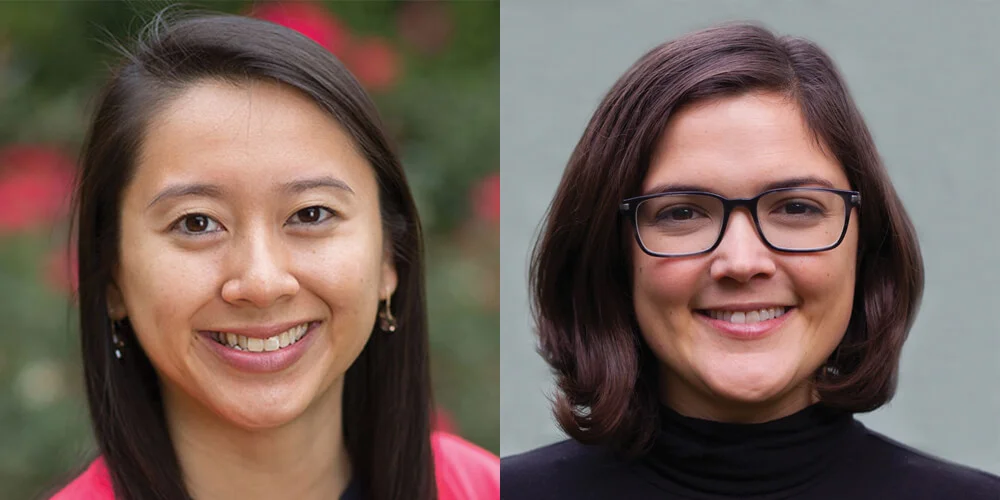
The closure of schools and daycare centers last year after the pandemic’s onset left parents who are health care professionals wondering how to care for both their children and their patients.
The UNC Task Force for Childcare for Healthcare Workers – led by Assistant Professor of Health Behavior Liz Chen, PhD, MPH, and alumna Hannah Prentice-Dunn, MPH, project manager at the UNC Lineberger Comprehensive Cancer Center – was created to help generate solutions for health care workers affected by school and daycare closings.
The task force quickly launched childcarenc.org, a website for health care workers in the Triangle that provides a needs-assessment survey, in-home COVID-19 safety suggestions, family guidelines, emergency services and resources offered by organizations across the state.
Chen also is helping people cope with COVID-19 through the mobile app Real Talk. Founded in 2017 by Chen and health behavior alumna Cristina Leos (MSPH, PhD ‘19), Real Talk crowdsources teen stories about mental health and other topics and pairs each story with helpful resources. As COVID-19 spread, app users described feeling worried about health concerns, having trouble coping with school closures, struggling with strained relationships and not having any sources of support. Real Talk created the first mental health resource guide available specifically for teens to help them deal with COVID-19 concerns.
Assessing risk across the Americas
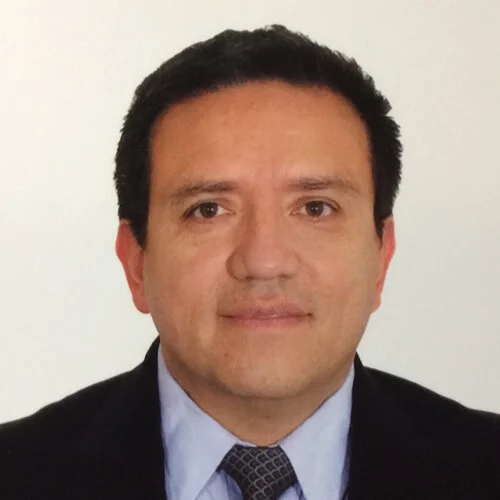
Benjamin Puertas, DrPH, is helping to protect front-line workers and patients by working with the Pan American Health Organization (PAHO) to train health care workers and ensure the use of best practices in fighting COVID-19.
As PAHO’s adviser in human resources for 26 Caribbean countries, Puertas was deployed to Grenada when the pandemic first hit. By conducting risk assessments and trainings and analyzing capacity, he and the PAHO team increased the safety and efficiency of the response in Grenada’s hospitals.
Puertas monitors shortages of health care professionals across the Caribbean to ensure that reinforcements go where they’re needed most and advocates for measures that have proven effective in other countries. For example, instead of hiring doctors, Jamaica, with PAHO support, trained community health workers to do the contact tracing, triage and referral of COVID-19 patients.
“Many countries must put more effort into strengthening their health systems based on primary health care,” he says.
Expanding philanthropy by expanding equity
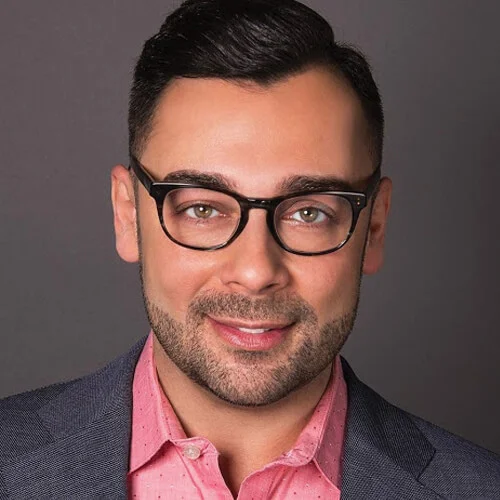
After receiving both bachelor’s and master’s degrees from the Gillings School, Edgar Villanueva, MHA, turned toward bringing more equity into philanthropy. Now, he’s been helping Native American communities, which are disproportionately affected by COVID-19, recover from the pandemic.
Based on the success of his first book, Decolonizing Wealth, Villanueva launched the Decolonizing Wealth Project (DWP) to help philanthropic organizations give more equitably by bringing more diverse voices to funding conversations. Through its Native American Community Response Fund, the DWP directed $2 million in pandemic aid through Native American-led nonprofits that work to alleviate food insecurity and inadequate access to housing and care, especially among elderly Native Americans.
“It’s not about charity; it’s about solidarity,” he says. “Native communities offer solutions to society’s most pressing problems. We must practice radical solidarity and understand that all of our suffering and thriving are mutual.”
Advancing equity through pandemic response
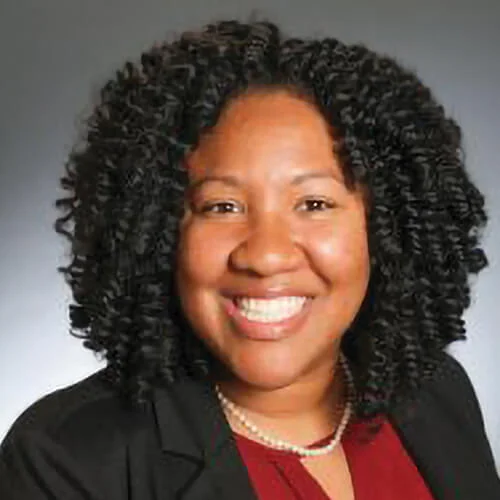
As emergency response director for the CDC Foundation, Gillings alumna Turquoise Sidibe, MPH, leads the Foundation’s 200-plus active COVID-19 projects.
The CDC Foundation is an independent nonprofit that channels philanthropic and private-sector resources to support the health-protection work of the U.S. Centers for Disease Control and Prevention (CDC). The Foundation supports CDC projects and manages its own international and domestic projects that advance the CDC’s work and mission.
While health equity has always been a focus for Sidibe, the COVID-19 pandemic brought them to the forefront. For example, she’s studying COVID-related resilience among Asian American, Black, Latinx, LGBTQIA and immigrant communities to learn what kind of social stigma comes with testing positive or having a family member test positive for COVID-19. Her goal is to create a model for collecting information on groups that are often underrepresented in existing data.
“My unit has a strong history of bringing a health equity lens into emergency response,” said Sidibe, a health behavior alumna. “The pandemic has increased awareness of this need, and there is a specific emphasis from CDC on making sure projects are equity focused. It’s important to be sure we’re making an impact in the communities with the most need.”
Sharing frontline workers’ COVID stories
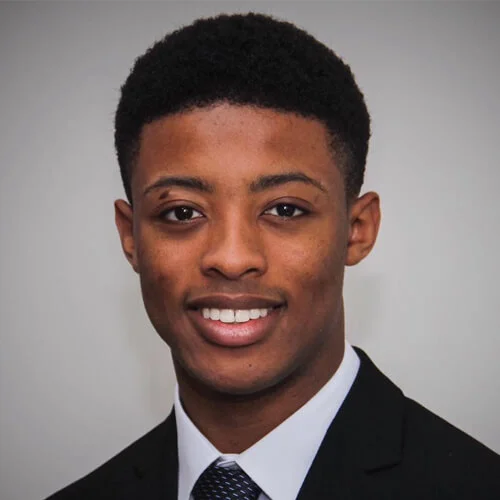
As a summer intern for the North Carolina Institute for Public Health (NCIPH), Brandon Adams, a Master of Public Health (MPH) student in global health, helped develop NCIPH’s curation project called Behind the Numbers, which focuses on the experiences of COVID-19 frontline health care workers. The project relies on qualitative techniques to effectively collect the stories and feelings from those affected by this unprecedented time.
“What I love about this project is its emphasis on the mental health and support of our frontline workers,” said Brandon, who was recognized for his work in “Students Who Rocked Public Health 2020” by JPHMP Direct, the companion website of the Journal of Public Health Management and Practice.
Outreach efforts protect, support farmworkers
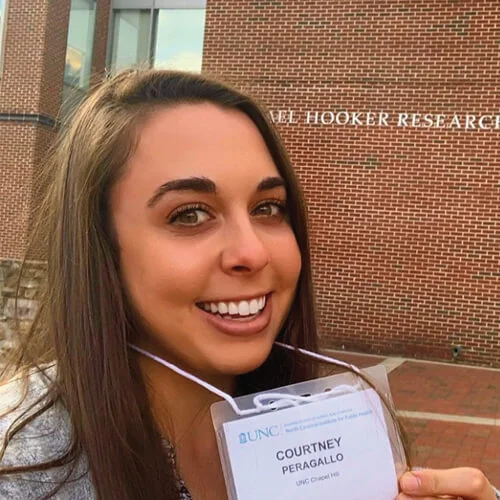
Graduate student Courtney Peragallo began her pursuit of a Master of Public Health degree in January 2020, but her work in global health started as an undergraduate when she took an internship related to her double-major of Spanish and public health.
In that internship, she worked with Spanish-speaking farmworkers at a nonprofit organization in the NC Farmworker Health Program (NCFHP), which serves migrant and seasonal farmworkers and their families. She then became a project coordinator with the NC Office of Rural Health as part of a disaster preparedness initiative for the farmworker community.
During the pandemic, Peragallo has been securing grants for projects to protect and support farmworkers and to provide rural outreach staff with personal protective equipment so they can keep themselves and their communities safe at mobile clinics in farmworker campsites.
“Outreach staff members are vital for farmworker populations, since they are most likely the first point of contact in a crisis, whether it be the COVID-19 pandemic or natural disasters,” she says.
Educating families, patients through volunteer work
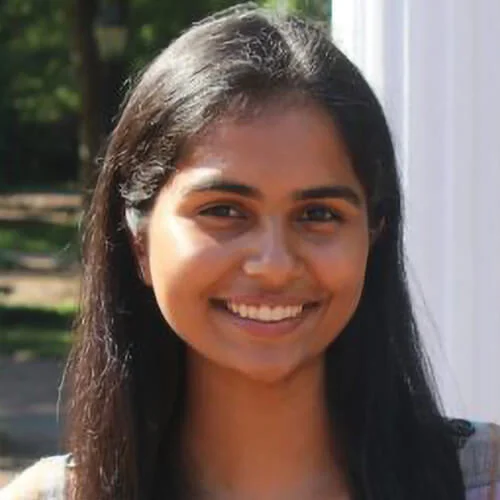
An active volunteer, Vennela Avula, a student in environmental sciences and engineering, has helped three different organizations with COVID-19 outreach.
Working with Carolina Conexiones, a volunteer group within UNC Hospitals, Avula created easy-to-understand visuals on COVID-19 and other health issues that are targeted toward local Spanish-speaking populations. She also worked with Durham-area grocery stores serving Spanish-speaking customers to help implement social distancing protocols, hand out masks and provide shoppers with public health information.
As a volunteer at the Women’s Health Information Center at UNC Medical Center, during the pandemic Avula has given virtual maternity tours of UNC Hospitals to expecting women to update them on COVID-19 policies and prepare them for their labor and delivery.
Avula is also co-president of UNC’s chapter of GlobeMed, a national non-profit organization that fosters partnerships between university chapters and grassroots organizations around the world that is partnered with the Association for Health and Development Guatemala (ASSADE), a non-profit that provides primary health services and health education to rural and indigenous communities in Guatemala. GlobeMed members created infographic manuals on preventive education and mental health that ASSADE has used in Guatemalan communities to reduce the spread of COVID and give local residents tools to deal with pandemic-related stress.
Raising awareness of virus’ disparate impacts

Since the pandemic began, pediatrician and MPH student Khadijia Tribie Reid, MD, FAAP, has been increasing awareness about COVID-19’s disparate impact on communities of color, often due to higher rates of pre-existing conditions like cardiovascular disease and diabetes that make people more susceptible to the worst effects of the virus.
“Unfortunately, just in North Carolina, we’ve dealt with infant mortality rates twice as high for African American babies,” says Tribie Reid, who is enrolled in MPH@UNC’s Leadership in Practice concentration. “Babies less than one year old are more than twice as likely to die before the age of one than white babies.”
Tribie Reid, a pediatrician at MedNorth Health Center in Wilmington, studies increased risks of child maltreatment and childhood adversity during times of social isolation and during natural disasters. Her practicum will include a webinar presentation for regional child welfare stakeholders.


